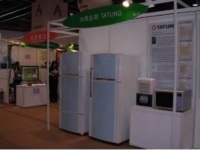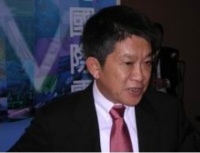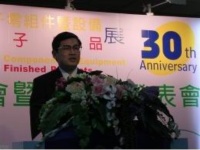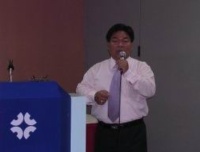Taiwan's IT and Electronics Industries Go Green
Oct 26, 2004 Ι Industry In-Focus Ι Electronics and Computers Ι By Quincy, CENS
Green appliances demostrated at the "Green Supply Chain" pavilion at the 2004 Taitronics exhibition show the progress of Taiwan manufacturers in the area of "green production."
The answer, though widely discussed in the past few years, becomes clearer as environment-protection concerns have gained priority in most industrially advanced nations. Electronic products are now required to undergo a salvo of stringent environmental-impact certifications, in addition to safety approvals, before they are displayed on stores' racks. Meeting these strict requirements means that electronics makers need to go green, and therein lie both the challenge and the hope for Taiwan in this sector.
New Chance: Green
There is nothing new about the idea of making green products, but the concept has only attracted serious attention in Taiwan's electronics industry in the past three to four years. Its rise to the forefront has coincided with the government's vigorous promotion of Made-in-Taiwan (MIT) products overseas, especially in Europe and the U.S.
"In 2006, we hope that every MIT electronic, electrical-machinery, and information-technology (IT) product will be a "green product," says Yu Shuh-woei, vice president of Industrial Technology Research Institute (ITRI) and general director of the Center for Environmental, Safety and Health Technology Development (CESH)." Green competitiveness is one of the keys to Taiwan's continued overall competitiveness in the electronic and IT lines. If we succeed in setting up a comprehensive green supply chain in Taiwan in the coming few years, MIT products will be increasingly competitive in the international market.
"The coming three to five years will be decisive, requiring new concepts, materials, production technologies, and equipment," Yu adds. "But such a supply chain will pay off in fostering the 'sustainable development' of Taiwan's electronic and IT lines."
Yu notes that the European Union (EU) promulgated the EC Directive on Restriction of the Use of Certain Hazardous Substances in Electrical and Electronic Equipment (RoHS) and EC Directive on Waste Electrical and Electronic Equipment (WEEE) in 2003, encompassing 10 categories of products for EU import qualification.
According to Yu, the regulated product categories and items in the RoHS and WEEE will gradually be increased. The sooner local makers of electronic and IT products comply with these demands, the greater their competitiveness will be against their foreign competitors.
ITRI's efforts, according to Yu, started four years ago with the cultivation of testing capability at the Electronics Research & Service Organization (ERSO), which is expected to help local makers certify their products and provide them with related information. But such efforts, Yu says, are only passive approaches to helping Taiwan companies form green supply chains.
A more positive approach, Yu says, has been taken by CESH, which has been actively integrating the government, business, research, and academic sectors to jointly map out a clear and comprehensive policy for responding to the RoHS and WEEE initiatives. "It is a big issue," Yu admits. "But CESH is tapping all of its resources to help local makers meet these requirements and, in a more aggressive way, to cultivate ability to affect directives and regulations by setting new industrial standards."
Yu claims that green products represent a good chance to strengthen Taiwan's competitiveness against rivals in mainland China and South Korea. As he knows, makers in mainland China (excluding most Taiwan-based companies) are still focusing on low-cost manufacturing without paying much attention to green concepts, while South Korea lacks units like CESH to help producers meet increasingly stringent environment-protection rules in major export markets.
"Taiwan is already a global supply base of IT and electronic products," Yu says. "It should now create a green product niche market rather than let the market manipulate it. CESH will closely cooperate with the Taiwan Electrical and Electronic Manufacturers' Association (TEEMA) and other related units to set up a technical platform, which will include a mechanism to let local companies register and certify their products."
Next Step
Joseph Cheng, secretary general of TEEMA, also stresses that all Taiwan electronic and IT makers need to set up green supply chains as soon as possible.
Joseph Cheng of TEEMA urged local IT- and electronics-product makers to set up green supply chains as soon as possible.
In the first eight months of this year, Cheng says, Taiwan exported US$40.9 million worth of electronic and electrical-machinery products, up 26% from the same period of last year. In 21 IT product categories, Taiwan now tops the world (when including products produced by Taiwan-based companies overseas), and all major electronic and IT products are expected enjoy double-digit sales growth this year. "Taiwan's IT and electronic lines are already globally known for their unmatched advantages, including tightly integrated production clusters, fast time to market, and ability to quickly meet customer needs.
"In the twenty-first century there will be an unprecedented focus on energy-saving and environmental protection," Cheng says. "Taiwan's IT and electronic lines should therefore benefit from enhancing their green competitiveness."
EU Raises the Bar
Thomas Chang, a doctoral candidate at Imperial College of London, points out that the WEEE and RoHS are directives generated from integrated concepts of environmental laws, social responsibility and green consumption. Both regulations encourage makers to adopt product end-of-life management, eco-design, life-cycle thinking, and extended producer responsibility to upgrade the recycling and re-generation ratios, improve environmental protection performance, and realize the responsibility producers have in terms of mitigating the environmental impact of their operations and products.
Thomas Chang says that the WEEE and the RoHS directives join the concepts of environment laws, social responsibility, and green consumption.
Chang points out that branded-product manufacturers, component manufacturers, importers, and retailers will be most affected by the new rules. The WEEE currently regulates 10 product categories, including large home appliances (refrigerators, washing machines, dryers, etc.); small home appliances (vacuum cleaners, electronic clocks, etc.); information and communications equipment (personal computers, copy machines, telephones, etc.); consumer-electronic products (TVs, video players/recorders, stereo equipment); illumination equipment (fluorescent lamps, table lamps, etc.); electric tools (electric drills, saws, lawnmowers, etc.); toys, recreational and sporting equipment (TV game consoles, golf-practice equipment, etc.); medical equipment; inspection/control equipment (temperature controllers, central controllers, etc.); and automatic vending machines (kiosks, etc.). According to Chang, other products are expected to gradually be added to the list, such as DVD players.
According to Chang, most big international IT brands, including IBM, Dell, and HP, have been pushing for the WEEE and RoHS in Europe because they see them as a chance to secure their future businesses. A high-ranking IBM official has stated that IBM's every environmental decision is business decision, Chang says.
"Each big IT brands has their own concerns and strategy with the WEEE and RoHS," Chang explains. "For example, IBM now has the world's most advanced environmental protection industry policies and related technologies and plans to utilize them to recover its global-leading strength in the green trend."
Chang says that the green moves of the big brand will directly affect how their Taiwan contract makers and supply chains operate. For example, he adds, Dell has decided to choose Taiwan as its first global-supply base to meet the WEEE and RoHS regulations.
Before the WEEE is finalized, Chang says, IT/electronic-product makers in Taiwan should review their environmental management systems and find useful tools that can be integrated to meet the requirements of the WEEE and RoHS. Local makers, Chang adds, should also collect information on WEEE and RoHS developments through the government's overseas units or their branches in Europe; cultivate environmental protection talent and cooperate with lawyers to avoid signing unfair agreements with foreign customers; and explore new opportunities in WEEE- and RoHS-related businesses in the EU.
©1995-2006 Copyright China Economic News Service All Rights Reserved.









